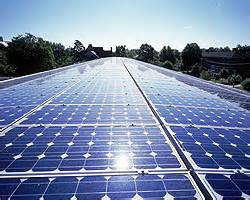
Tariffs on Solar Cell Imports Could Undermine U.S. Energy Security and American Competitiveness
On September 22, 2017 the International Trade Commission ruled unanimously that Chinese solar manufacturers were adversely affecting U.S. solar manufacturers by dumping under priced silicon crystalline solar cells on U.S. markets. The commission has until November 13 to make recommendations on the most appropriate measures to rectify the situation. Once provided the commission’s recommendations, President Trump will have significant latitude to either accept, expand, modify or reject those measures. The options could potentially “include establishing tariffs or minimum prices on imported solar equipment.” From the perspective of U.S. energy security and American competitiveness, the costs of protectionist measures on solar imports greatly outweighs potential gains. The limited benefits to a few manufacturers would cripple the U.S. solar installation industry, undermine U.S. energy security, and reduce U.S. economic growth.
The Downside of Tariffs
The effects of instituting protective measures against solar cell imports would be extremely detrimental to both U.S. competitiveness and U.S. energy security overall. Increasing prices on solar cells would hurt both U.S. consumers and U.S. suppliers.
A recent report from the International Renewable Energy Agency found that solar jobs have expanded 17 times faster than the total U.S. economy and are up 24% since 2015. The massive growth in the U.S. solar industry is due to “the falling cost of solar energy and generous federal tax credits that make it more affordable for businesses and homeowners.” But, protectionist measures may bring all of this to a screeching halt.
According to the Solar Energy Industries Association (SEIA), “the solar panel manufactures employ about 8,000 Americans while 240,000 U.S. jobs are related to selling and installing solar panels.” The U.S. solar industry is now warning that 88,000 U.S. solar installation and sales jobs could be lost to try and protect 8000 solar manufacturing jobs, resulting in a net loss of 80,000 U.S. jobs. If these estimates are correct, it defies basic logic to go forward with protectionist policies that will cost more jobs than it saves.
Additionally, SEIA estimates that “the utility-scale market would see jobs drop by 60%, while residential and commercial jobs would drop by 44% and 46% respectively.” The solar utility industry would likely be the hardest hit because they are more sensitive to price increases. This could lead to greater reductions in large scale renewable energy production and a pivot back to fossil fuel systems such as natural gas. Going forward, GTM Research “estimates that more than half of all projected solar installations from 2019 to 2021 would be cancelled.”
The risk to U.S energy security is that the country will become more reliant on fossil fuels and other less scalable forms of renewable energy. That could potentially worsen environmental conditions in the U.S., reduce innovation in key sectors, and lead to greater dependence on energy from volatile regions.
The Future for Solar Power
Not all solar is the same. There are a variety of different designs, material requirements, costs, and efficiency levels. Therefore, while the vast majority of the U.S. solar industry would suffer from the imposition of protectionist measures there are a variety of companies and technologies that might benefit from protectionist measures on solar imports. This is due to the fact that the impact from protectionist measures will depend on the scope and the exact wording of the rules that are enacted. If a price floor is instituted, certain U.S. manufacturers, such as Sun Power, could benefit since they already sell more efficient panels at higher per-watt prices than competitors. On the other hand, if tariffs are instituted and the rules are written in a way that only applies to silicon based solar cells, companies like First Solar could benefit since they only produce thin filmed cadmium telluride solar cells.
Additionally, U.S. developers of advanced solar cell technology, such as multijunction cells, may also benefit from protectionist measures. These solar cells are still in the R&D stage but recent developments by companies such as Solar Technical LLC may lead to cheaper and more competitive designs. Multijunction solar cells have been shown to achieve two to three times the efficiency of traditional silicon or cadmium cells. However, these solar cells have struggled to compete with cheaper designs due to higher initial costs and greater complexity to manufacture. Yet, with the introduction of either a tariff or a price floor these revolutionary solar cells may gain the competitive edge that they’ve been lacking.
None the less, the overall impact of protectionist policies on solar imports would be extremely negative to U.S. energy security and U.S. competitiveness. While there may be some limited benefits from such measures they do not outweigh the costs.





